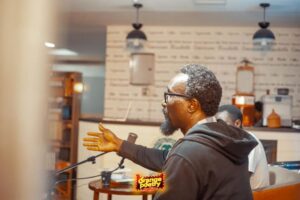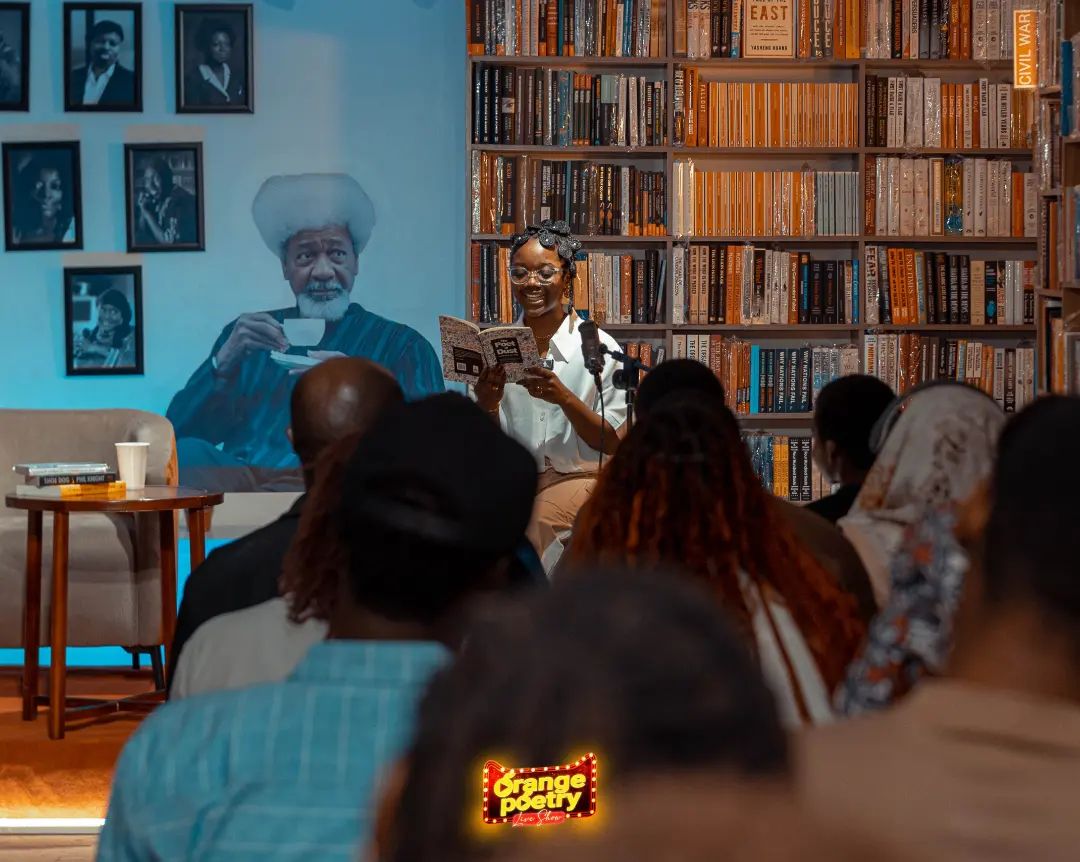Emmanuel Adekunle never envisioned a future in poetry. Growing up in rural Bwari, a community on the outskirts of Abuja, his days were filled with thoughts about his family’s farm, school, and the uncertain future. At 19, he assumed poetry was an art reserved for literary elites, far removed from his reality. But that changed the day he attended a poetry workshop organised by the Orange Poetry Group under its School Poetry Initiative.
“I wasn’t sure what to expect,” Emmanuel recalls, “but the minute I listened to other young people like me perform poems about poverty, dreams, and injustice—things I had experienced—I realized poetry wasn’t just words on paper; it was life itself, spoken boldly.”
This workshop transformed Emmanuel’s perception of poetry and opened up a world of self-expression. He began writing poems about his struggles and observations, touching on issues like climate change, unemployment, and inequality—issues that resonate with many young Nigerians. Today, Emmanuel is an emerging voice in Nigeria’s poetry scene, winning awards at local competitions. He credits the Orange Poetry Group for giving him the confidence and platform to explore his passion.
Poetry holds a deep-rooted place in Nigeria’s history, once serving as a vital means of oral storytelling and communal reflection. Early poets like Christopher Okigbo, Wole Soyinka and Gabriel Okara bridged this oral tradition with written literature, creating works that addressed political freedom, identity, and the African experience. But by the late 20th century, poetry began to wane in prominence, overshadowed by fiction and drama. The commercialisation of literature, along with a lack of formal platforms for poets, contributed to its decline.
Unlike fiction, poetry had few festivals, competitions, or public events to encourage the next generation of poets, leaving aspiring writers like Emmanuel with limited means of expression. Performance poetry, however, began to emerge in recent years, re-energizing interest in poetry among young people. Poetry slams, open mic nights, and festivals for spoken word became outlets for young voices to speak out on societal ills like corruption and police brutality.
Yet, these opportunities remained largely urban, concentrated in cities like Lagos and Abuja. Rural areas, like Bwari, were often left out of this cultural renaissance—until organisations like the Orange Poetry Group stepped in.
The Orange Poetry Group
Founded in 2015 by poets and educators including Director ET, Pariolodo, and Chika Unigwe, the Orange Poetry Group set out to address the gaps in Nigeria’s poetry landscape. Through its School Poetry Initiative, the organisation runs poetry workshops, competitions, and mentorship programmes in secondary schools across the country, introducing young people to the art form and providing them with tools for creative expression.
For Emmanuel, this initiative was life-changing. “They taught us that poetry is not just an elitist art,” he says. “It tells our stories, challenges the system, and inspires change.”
The group’s flagship event—a nationwide poetry slam—has become a vital platform for emerging poets. The slam attracts participants from across Nigeria, offering young voices the opportunity to showcase their talent in front of established writers and new audiences. Many of these poets, like Emmanuel, use the stage to address pressing social issues, making poetry not just an art form but a tool for advocacy and community building.

Impact and Future Directions
The impact of the Orange Poetry Group’s work extends beyond individual poets like Emmanuel. By nurturing talent in underprivileged communities and offering platforms for expression, the group is helping to revive Nigeria’s poetic tradition while fostering a new generation of poets who are attuned to the realities of their society.
Director ET, one of the group’s co-founders, has been instrumental in shaping its outreach programmes, ensuring that poetry reaches students in rural areas. Fellow co-founder Dami Ajayi, a poet and medical doctor, brings a unique perspective to the group’s mission, exploring themes like mental health and identity in his work. Together, they and other members like Dike Chukwumerije and Pariolodo are creating spaces where poetry can thrive as a cultural and social force.
While much progress has been made, challenges remain. Many young poets still struggle to find platforms where their voices can be heard. Yet, the grassroots approach of the Orange Poetry Group is proving successful in reintroducing poetry into schools and communities across Nigeria. This renewed interest in poetry is not just about reviving an art form but also about giving young people a medium to express their concerns, confront societal problems, and envision change.
A New Chapter in Nigerian Poetry
For Emmanuel Adekunle, the journey from uncertain teenager to budding poet symbolises the broader impact of the Orange Poetry Group’s work. “I may have never known my voice counted for anything without them,” he says. “They gave me a platform of expression and the courage to make my voice heard on issues affecting my community.”
Through mentorship, performance spaces, and outreach, the Orange Poetry Group is ensuring that poetry remains a vibrant part of Nigeria’s cultural heritage. By bridging the gap between urban and rural poets, and by offering young people the tools to challenge the status quo, the group is not only reviving poetry but also using it as a catalyst for social change.
In doing so, organisations like the Orange Poetry Group are writing a new chapter in Nigerian literature—one in which poetry is once again a powerful tool for self-expression, cultural preservation, and social transformation.
Emmanuel Adekunle, hailing from rural Bwari near Abuja, initially perceived poetry as an art form reserved for the literary elite. This view changed at a poetry workshop by the Orange Poetry Group under the School Poetry Initiative, where he discovered poetry as a medium to express his experiences and societal issues like poverty, climate change, and inequality. Today, he is recognized as a rising voice in Nigeria's poetry scene, thanks to the encouragement and platform provided by the group.
The Orange Poetry Group, founded in 2015 by poets and educators, aims to fill the gaps in Nigeria's poetry landscape. Their School Poetry Initiative introduces young people to poetry through workshops and mentorships, emphasizing that poetry is a means to tell stories, challenge systems, and inspire change. Their nationwide poetry slams offer young poets like Emmanuel opportunities to engage with established writers and audiences, using poetry as a tool for advocacy.
The group's impact extends to reviving Nigeria's poetic tradition and fostering new poets attuned to societal realities, particularly in underprivileged and rural areas. Co-founders like Director ET and Dami Ajayi, alongside other members, are pivotal in ensuring poetry reaches diverse communities. Despite challenges, the Orange Poetry Group's grassroots approach is effectively reintroducing poetry to Nigerian schools, providing a medium for youth to express and address social issues, envisioning change, and ensuring poetry remains a vital cultural and social force in Nigeria.






